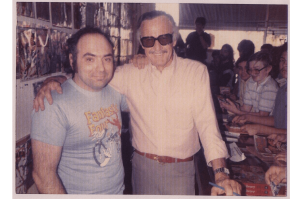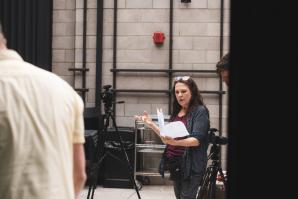The general image that comes to mind for most people when describing a film festival are grand events like the Sundance festival in Utah or the Cannes in France, but Sacramento has more than a handful of its own staple events.
Film festivals have a strong cultural impact on the communities who host them — as well as an economic effect. According to the Sundance Institute’s 2023 economic impact report, the Sundance Film Festival brought in about 21,400 attendees from out of state, who in turn spent over $97 million during the festival. The average out of state visitor spent over $1,500 on lodging and a little over $1,100 on meals.
While it’s unlikely any of the film festivals in Sacramento would be able to match these numbers, Sundance does provide insight into how a film festival can bring positive economic benefits to a community. People come and spend their money at hotels, restaurants and the festivals themselves.
A prime example of this in Sacramento can be found in one of the newer festivals, the Oak Park Black Film Festival, set to take place at the Guild Theater from Oct. 9-13 this year. The festival, which started in 2022, is operated by St. HOPE, a family of nonprofits aimed at revitalization of the Oak Park neighborhood.
“The Oak Park Black Film Festival brings people in, and it brings people out,” says Cassandra Jennings, the CEO and President of St. HOPE. “It brings the people who are in the region out to really enjoy some great theater and great art.”
Jennings says the festival brought in filmmakers and their fans, with many of the people who travel to see the festival coming out of the Bay Area. “They stay in our hotels, they dine in our restaurants, they shop in our stores,” she says. “We see all the sales go up when we have continuous and great events like this.”
Jennings says St. HOPE is always trying to make Oak Park the place to be and that the film festival is an important part of that process. “It creates a great vibe that’s just unbelievable.”
President and CEO of St. HOPE Cassandra Jennings, photographed at
the Guild Theater, says the Oak Park FIlm Festival is hoping to
have more involvement from local film makers in Sacramento.

Another festival that has become a staple of the Sacramento circuit is the Sacramento French Film Festival, scheduled from June 7-9. According to the festival’s website, the SFFF is the second-largest French film festival on the West Coast, after the American French Film Festival in Los Angeles.
One of the festival’s co-founders is Cécile Downs, who is originally from France. She came to the U.S. as part of the French Cultural Embassy and has since been awarded the Chevalier des Arts et des Lettres from the French government for her work.
“I had thought about creating this festival, and it was almost an immediate success,” Downs says.
The festival is focused on bringing films the Sacramento audience generally wouldn’t get to see, including films nominated for the French equivalent of the Academy Awards, the César Awards, Downs says. She believes the festival has a positive impact for the local area.
“They eat in the neighborhood and get a drink in the neighborhood,” Downs says. “Local businesses do benefit from the festival.”
The festival is being hosted by the Tower Theatre, having moved there last year from the Crest Theatre. Rachel Smith, whose company Wordsmith Communications handles public relations for the Tower Building’s owners, said the goal is to work towards enhancing events like the SFFF at the theater.
“If the theater is having a festival of some kind, how can we incorporate the other businesses to make it as impactful as possible?” Smith says.
Smith says that for the SFFF, that involves looking at what kind of items can be added to the menus of the property’s restaurants, the Tower Café and Sampino’s Kitchen at Joe Marty’s. She says they are also looking to work with other businesses for this and future events.
“These film festivals are so iconic; they’re so special,” Smith says. “We know Tower is such an important venue and icon to Sacramento and to film aficionados far beyond Sacramento.”
Smith says on top of the cultural underpinnings events like film festivals brought to the local area, there were economic benefits as well, such as foot traffic to local businesses.
While the various film festivals are run independently of one another, there has been some effort to better organize the events. One key part of this is the Directors of Film Festivals Summit started two years ago by Access Sacramento.
“Twice a year we meet and discuss the economics of the film festivals, what’s working, what’s not,” says Christina Jeffers, Access Sacramento’s director of development, marketing and sales. “We welcome anyone who calls themselves a film festival director.”
Hosting the Sacramento Asian Pacific Film Festival from May 25 to
May 26, The Sofia is one of several theaters presenting film
festivals this year.

In addition to helping organize other film festivals, Access Sacramento also runs their own event, A Place Called Sacramento. The 2024 edition is set to take place on Oct. 11 at the Crest Theatre.
Jeffers has been involved with the Sacramento film scene for years and has worked to promote film festivals in the area. Part of this work has included helping create a festival guide for Access Sacramento called Sacramento See-A-Film, produced together with the nonprofit SacGeeks and its president and co-founder Bex Francis.
“One of the reasons why we made the film festival guide was because there’s so many of us that want to play well together and not step on each other’s toes,” Jeffers says. “When we work collaboratively. I think it makes a great circuit.”
Jeffers says the festivals attract thousands of people from outside of Sacramento County and that several film makers who submitted films to the festivals brought their fans along with them.
“They’ll make a weekend of it, they’ll come stay at a hotel, do three days of a film fest and drive back to the Bay,” Jeffers says. “It does drive, I think, a significant amount of economic impact.”
Jeffers says the Crest Theatre was a good example of this, pointing out that $20 a seat could drive a large influx of cash. She says that a film festival could have six to eight screening blocks, groups of films categorized by genre or medium, and sell tickets and passes for those blocks; each block could represent 900 seats.
While the festivals have a lot of upsides, their organizers can also face difficulties while trying to put them together. The COVID-19 pandemic added even more.
“We had our cast and crew called outdoors, our filmmaking teams were very small, of course we had to observe all the COVID compliance for film sets,” Jeffers says. “We also did a hybrid where we were streaming online.”
Jeffers says the hybrid method expanded the audience from local to international and that Access Sacramento’s film festival managed to still make money because of it. Downs says the French Film festival also saw success with their first virtual event, though those numbers have since dropped off.
While some festivals were able to weather the storm of COVID-19, not all were as fortunate. Jeffers says the 25 festivals listed in the Access Sacramento guide were down from the 32 last year. Downs says many festivals, like the Sacramento Japanese Film Festival, disappeared during the pandemic.
Promoting the film festivals as a whole can also have difficulties. Downs says the festivals all served various purposes and niches, which could cause some difficulties in selling them together.
“It’s hard to create some kind of synergy,” Downs says. “The only need we really have in common is the need for marketing.”
In spite of the difficulties of running the festival, Downs said she was still optimistic about its future.
“A sign that we’re moving in the right direction is that we were contacted to do something this year,” Downs says. “We’re back to being more involved in the community.”
Correction June 7, 2024: A previous version of this article did not mention that SacGeeks and its founder Bex Francis were involved in producing the See-a-Film festival guide. The mention has been added.
–
Subscribe to the Comstock’s newsletter today.
Recommended For You

Lights, Camera, Sacto
Warner Bros. movie starring Leonardo DiCaprio highlights Sacramento as filming location
With Sacramento nearly 400 miles from Hollywood and an increasing number of films shot in Georgia for tax purposes, the Capital Region doesn’t frequently host productions. But when it happens, people can get excited.

Is Stockton Poised to Become a Branch Office of the Marvel Universe?
City officials are trying to lure the superheroes
Maybe Stockton should rebrand itself Upper Tinseltown. This port city, less than an hour’s drive from the capital — and the setting for a number of Hollywood films over the years — is on a mission to make itself a presence in the next “Fantastic Four” movie, due to be released in 2025

Getting to Know: Lori Richardson
A film industry veteran branches into the compliance training genre — using Sacramento talent
The compliance content genre has a reputation for being outdated, but the video series Lori Richardson produces for the e-learning company Emtrain look like they could be part of a Netflix drama.

A Japantown Jazz Star Comes Home
1936 film starring Sacramento-born singer Betty Inada is screened in Sacramento
Betty Inada, a Japanese American jazz singer born in Sacramento in 1913, sought fame in Japan in a time when American screens and stages had little space for Asian women.



